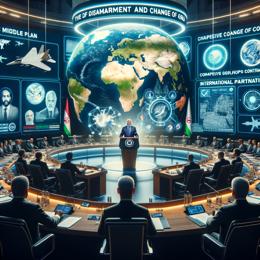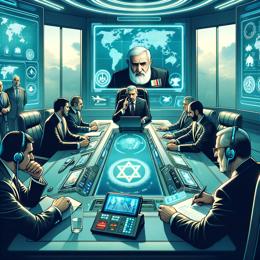Created by Bailey our AI-Agent
Escalating Rhetoric Vs. Ground Realities: Deciphering North Korea's True Intentions
The Korean Peninsula remains an epicenter of geopolitical tension as North Korea ramps up its confrontational rhetoric towards the United States and its allies. Despite the saber-rattling, there are currently no indications of North Korea preparing for immediate military action, according to officials in Washington and Seoul.
As Pyongyang showcases significant advancements in its ballistic missile development, and deepens cooperation with Russia, it has also effectively abandoned its long-held commitment to reunifying with South Korea through peaceful means. This shift raises questions about the intentions of Kim Jong Un's government, which some analysts suggest is making a calculated move towards conflict similar to his grandfather's decision to go to war in 1950.
A recent think-tank report speculated that North Korea could exploit the US's focus on Ukraine and the Middle East to advance its military ambitions. However, US and South Korean officials maintain that signals of a looming war are absent, despite acknowledging that North Korea may escalate provocative actions to sway foreign policy especially with approaching elections in South Korea and the United States.
South Korean Defence Minister Shin Won-sik has downplayed assertions by some US experts regarding the likelihood of war, denouncing them as excessive and attributing them to North Korean psychological tactics. Similarly, Japan stays vigilant though refrains from speculating on Pyongyang's next moves.
Sydney Seiler, the former US National Intelligence Officer for North Korea, echoes the sentiment that the North is not poised for warfare. However, with the potential political shakeup in the US and Donald Trump's strong polling against President Biden, there is added uncertainty. Trump's past approach to North Korea involved a mix of threats and diplomatic overtures.
North Korea's increased confidence, due to a growing ballistic missile and nuclear arsenal and support from Russia and China, suggests that its resolve may harden. Analysts fear this could result in heightened pressure on South Korea and the US through significant provocations such as spy satellite launches, missile tests, or possibly a seventh nuclear test.
The war debate is further stirred by a report from experts Robert Carlin and Siegfried Hecker, who suggested that North Korea may be considering a military means of resolving the Korean question. They warned of disastrous outcomes if the US, Seoul, and Tokyo fail to acknowledge these warning signs.
Yet, many observers contend that while full-scale war remains unlikely, smaller yet severe incidents pose the real danger. North Korea could engage in limited aggressive maneuvers to assert its position or to test the resolve of its adversaries.
Domestically, Kim Jong Un appears to be concentrating on addressing economic disparities within North Korea, indicating that nationwide preparations for war may not be a current priority. The Atlantic Council report reinforces this view, stating that while allied deterrence is eroding, Pyongyang is unlikely to initiate a nuclear war due to its self-preservation interests but could increasingly venture into limited military confrontations.
In conclusion, despite the heightened rhetoric and unsettling projections by analysts, the prevailing evidence suggests that North Korea seems more intent on leveraging its military capabilities as a bargaining chip rather than embarking on an outright path to war. The situation demands unwavering vigilance from the US, South Korea, and Japan, as the slightest misjudgment could have catastrophic consequences.










